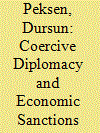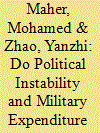|
|
|
Sort Order |
|
|
|
Items / Page
|
|
|
|
|
|
|
| Srl | Item |
| 1 |
ID:
187358


|
|
|
|
|
| Summary/Abstract |
Though reciprocity is an important aspect of coercive diplomacy, little is known about whether and when sanctioned countries (i.e., targets) respond to foreign pressure with their own counter-sanctions. The purpose of this article is to offer a comprehensive analysis of the conditions under which targets are more likely to employ economic counter-measures against their senders. Analyzing data for sanctions reciprocity episodes in the Threats and Imposition of Economic Sanctions (TIES) dataset, we find that targets with wealthier economies, less democratic regimes, or higher trade dependence on their senders are more likely to initiate reciprocal sanctions. Our findings also denote that sanctions reciprocity is more likely when targets are subject to sanctions by senders with poor economies or when the issue that instigates the initial sanctions is less salient. As the first cross-national, quantitative analysis of sanctions reciprocity, our analysis provides a more complete picture of how strategic ties between senders and targets unfold, and why some sanctions are more likely to fail or result in stalemate due to counter-sanctions employed by targets.
|
|
|
|
|
|
|
|
|
|
|
|
|
|
|
|
| 2 |
ID:
187360


|
|
|
|
|
| Summary/Abstract |
This paper examines the main determinants of French defense spending over the period 1958–2017. To estimate the determinants of defense spending, the demand defense literature considers both economic and strategic factors such as conflicts, threats, and alliances. Our approach is original because we focus on strategic factors, including proxies for an alliance’s membership and external threats. In addition, we include transnational terrorism as a proxy for internal threats. We find that defense spending is positively related to the gross domestic product, North Atlantic Treaty Organization membership, military operations abroad, and external threats and negatively linked to the population as a proxy to public service needs. These results are robust to changes in specifications and shifts in defense policy observed after 1991. This contribution underlines that the fundamental determinants of defense policy in France are economic conditions.
|
|
|
|
|
|
|
|
|
|
|
|
|
|
|
|
| 3 |
ID:
187362


|
|
|
|
|
| Summary/Abstract |
We examine the determinants of military spending of the six countries in the Gulf Region by using a partial adjustment model in a system setting estimated with the three-stage least squares (3SLS) method. Our model takes into consideration the institutional inertia as well as intercountry correlations, both observed and unobserved. In addition to economic variables, we also consider a series of strategic variables to shed light on various issues such as free riding and spill-in effects. Our findings based on annual data between 1980 and 2016 indicate that the military expenditures are influenced by both economic and strategic factors with a high degree of heterogeneity across different countries. Our results also show that the GCC member countries do not free ride on each others’ military expenditures. In addition, the US military presence is an important determinant of defense spending in the region.
|
|
|
|
|
|
|
|
|
|
|
|
|
|
|
|
| 4 |
ID:
187361


|
|
|
|
|
| Summary/Abstract |
Previous studies have investigated the relationship between political instability and economic growth separately from the relationship between military expenditure and economic growth. Besides, they did not cover the period after 2011 (i.e. the Arab Spring and its consequences). Therefore, this paper attempts to empirically analyze the long-run and short-run impacts of both political instability and military expenditure on economic growth in Egypt. We estimate the autoregressive distributed lag (ARDL) approach using data on the Egyptian economy over the period 1982–2018. For the robustness of our results, we use the fully modified ordinary least squares (FMOLS) estimator. Results of the ARDL approach indicate a significant negative relationship between political instability and economic growth in both the long-run and short-run. Contrarily, military expenditure has an insignificant impact on economic growth, especially in the long-run. These results are confirmed by the FMOLS estimator. Moreover, the estimated coefficient on the one-period lagged error correction term (ECTt-1) indicates that deviations from the long-run equilibrium relationship are corrected within a year.
|
|
|
|
|
|
|
|
|
|
|
|
|
|
|
|
| 5 |
ID:
187363


|
|
|
|
|
| Summary/Abstract |
The literature on social capital and its economic implications shows that trust plays a significant role in the transaction of goods and services. However, few studies empirically investigate the evolution of trust over time. In this paper, we show how individuals’ trust in Pakistan is affected by the persistent shock of terrorism. By matching the country representative survey data with district-level terrorist attacks, we observe that exposure to terrorism is associated with lower levels of interpersonal trust. This finding is robust to various robustness checks including different indicators of terrorism risk and trust. Furthermore, our results are also consistent with the IV identification strategy.
|
|
|
|
|
|
|
|
|
|
|
|
|
|
|
|
| 6 |
ID:
187359


|
|
|
|
|
| Summary/Abstract |
A vast economic literature examines the welfare gains and distributional consequences of economic reforms, while much less is generally known on the relationship of inequality and forced regime changes. Some studies analyze how economic inequality impacts the likelihood of coups, but the distributional outcomes of such events have been largely ignored to date. Employing novel data, we find that successful coups have a significant positive impact on the consumption shares of the lowest quintile and a strong negative impact on the highest quintile, as compared to the inexistent redistribution that results from failed coups. In addition, the redistributive effect is stronger for military coups, as compared to civilian coups, and effects seem to be substantially driven by coups against democratic regimes. Despite their negative impact on overall growth and per capita income, our results show that forced regime changes, as compared to non-successful attempts, reduce inequality at a short notice. This may partially explain their continued popularity in highly unequal developing countries.
|
|
|
|
|
|
|
|
|
|
|
|
|
|
|
|
|
|
|
|
|